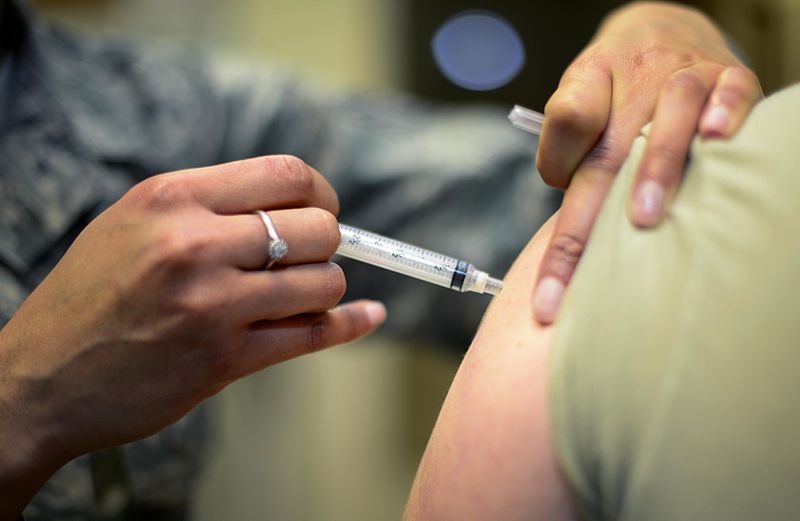The freedom to become an addict: The ethical implications of addiction vaccines
Tabitha Moses, M.S., is Administrative and Research Coordinator at Lehman College, CUNY, as well as a Research Affiliate at the National Core for Neuroethics at the University of British Columbia. Tabitha earned her BA in Cognitive Science and Philosophy and MS in Biotechnology from The Johns Hopkins University. She has conducted research in the areas of addiction, mental illness, and emerging neurotechnologies. She hopes to continue her education through a joint MD/PhD in Neuroscience while maintaining a focus on neuroethics.
The introduction of “addiction vaccines” has brought with it a belief that we have the potential to cure addicts before they have ever even tried a drug. Proponents of addiction vaccines hold that they will:
- prevent children from becoming addicted to drugs in the future,
- allow addicts to easily and safely stop using drugs, and
- potentially lower the social and economic costs of addiction for society at large.
However, it is critical to be aware of the limitations and risks - both ethical and physical - of introducing these vaccines into mainstream medical care.
 |
| A child receives a vaccine in the 1930s |
Before delving deeper into this discussion, we must understand that the term addiction vaccine is a misnomer. The vaccine itself is against a specific drug or substance, not against addiction in general. Currently these vaccines have been produced for nicotine, cocaine, and heroin. (See a previous blog post on cocaine vaccines here). While the different types of addiction vaccines have varying mechanisms, the end result is that an individual who has received the vaccine against a specific substance - cocaine, for instance - will no longer feel any of the effects of the substance that are typically associated with the high. As a result, the idea is that a person can never become addicted to a substance that does not have any physical or emotional feelings associated with it. It is also important to understand what is meant by addiction here. While there is still much controversy surrounding the underlying cause and neurological underpinnings of addiction, in general, addiction can be best described as “an inability to control use [or a substance or behavior], and that’s often best described as continued use despite potently negative consequences.” For more on the topic, see a previous post by Dr. Mike Kuhar on addiction here and an interview with Dr. Steve Hyman here.
It is, however, not an “addiction vaccine." The idea is that preventing an individual from feeling the highs associated with a certain substance will also prevent addiction to that substance. That said, if a nicotine-vaccinated individual tried a cigarette because she was craving a certain release and felt no sensation upon having one, there is nothing stopping her from finding a different high. As such, the vaccine does not stop all addictions per se.
When the news broke about these types of vaccines there were many parental groups espousing the potential positive impact the vaccines would have on their children. Some parents and even researchers suggested the idea of adding these vaccines to the regular pediatric vaccine schedule. However, while addiction indisputably has a negative impact on the individual and his or her family and friends, this vaccine is not in the same category as those in the regular vaccine regimen. Increasing evidence suggests that addiction is not just about the substance at hand, but about many other factors. The majority of addicts become addicted to substances as a result of deeper underlying mental health issues, and exposure to early life trauma and adversity. Removal of one substance will not remove the underlying problems or prevent addiction to other substances or behaviors. Frequently, without the appropriate care, an addict may stop using a specific drug only to replace it with another drug or behavior (substitution). Therefore, by vaccinating children against cocaine we are only stopping them from feeling effects of cocaine, not from becoming an addict.
 |
| Chart comparing past year psychiatric disorder between individuals with and without alcohol and drug use disorder--created by the author from data drawn from Stinson et al. |
Additionally, while the deadly viral and bacterial infections against which we usually vaccinate (such as polio, measles, and tetanus) have no known benefits, certain drugs do have potential benefits (for instance, nicotine, LSD, MDMA, and marijuana). If we permanently block the ability of the body to respond to these drugs, this could have future detrimental effects for the individual. For instance, if these drugs are developed for medical purposes the person who was vaccinated will not be able to receive the benefits of the drugs.
Furthermore, the question of autonomy falls heavily into play here. While it seems absurd to think that an individual might want the right to become addicted to a drug, it is less outrageous to believe that he or she might want the right to know firsthand what the effects of the drug are. Many people, particularly artists and others who work in creative fields, cite numerous professional benefits to using certain illicit drugs occasionally. And keep in mind, not everyone who tries a drug will become addicted to it. While others may not agree with these methods, and in particular with the legal implications, it would be difficult to argue that it is ethical to take this option away from a person before she is able to understand it.
If these vaccines are not to be given to children, the question that naturally follows is: when would it be appropriate to provide them to adults? For adults, the biggest concern with the vaccine is that of fully informed consent. To be able to make a fully informed decision, a person should be able to understand all implications. This is not possible unless she has experienced being under the influence of a certain drug. Unfortunately, this leads to its own set of ethical quandaries. Should we insist an individual sample a drug to know the “high” prior to receiving the vaccine? It seems completely unethical to insist that an individual, who is asking to not become addicted to a drug, try the very substance she actively wants to avoid. Although, it could also be unethical to remove the ability for a person to ever feel a certain way without that person’s full awareness of the substance’s effects.
 |
| Image by Senior Airman Areca Wilson |
However, we must ask what level of informed consent is necessary: We do not require a person to experience a disease prior to receiving a vaccination that prevents that disease. Do the effects of drugs such as cocaine and nicotine fall into this type of category? While there may be no perfect situation in which to provide the vaccine to people, there may be opportunities where it could be used as a therapeutic tool in concert with intensive therapy and treatment. In these cases the person receiving the vaccine should be sober and not in the severe stages of withdrawal when receiving the vaccine. There does not appear to be any situation in which it is appropriate to provide the vaccine non-consensually, be it to children or to individuals unable to consent.
The commonly overlooked question in much of this discussion is why individuals become addicted to certain substances. Addiction is not merely a result of a physiological addiction to a substance; for example, some individuals become addicted to substances as a result of deeper underlying mental health issues. Removal of one substance will not remove the underlying problems or prevent addiction to other substances or behaviors. Therefore, these addiction vaccines would likely not result in a reduction of addiction in general, but rather in the reduction of addiction to the substance for which the vaccine is crafted.
Addiction vaccines have the potential to mask the issue and lead to potentially larger problems. In their current form, they are by no means a cure, and in most circumstances they are unlikely to be appropriate. Nonetheless, these vaccines could play an important role in addiction treatment if administered with proper consent in appropriate situations. While these vaccines have the potential for good, the focus of addiction research should be on the underlying processes that lead to initiating and then continuing drug use as well as factors that lead to relapse.
Want to cite this post?
Moses, T. (2015). The freedom to become an addict: The ethical implications of addiction vaccines. The Neuroethics Blog. Retrieved on , from http://www.theneuroethicsblog.com/2015/12/the-freedom-to-become-addict-ethical.html




I disagree with this kind of opinion.
ReplyDelete